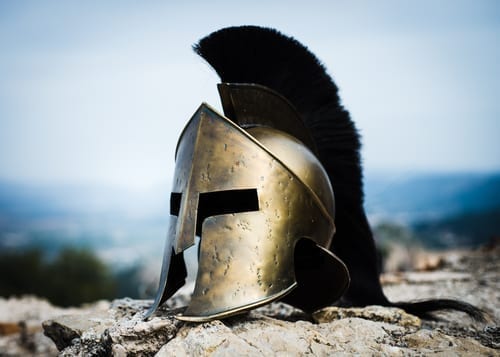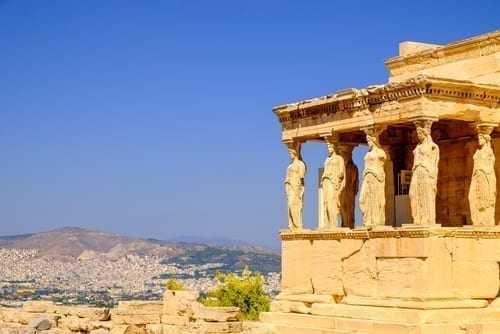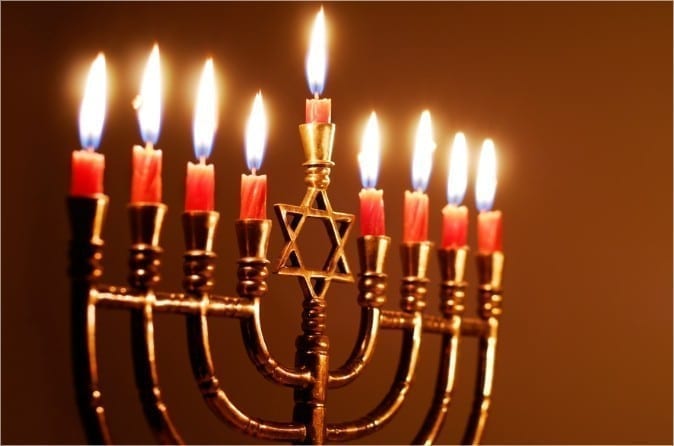Read Hanukkah: The Full Story (p. 4) – Translation of the Torah into Greek now!
The End of the Rule of the Ptolemies
During the period of Ptolemy IV, war was renewed between the Ptolemies and the Seleucids, the heirs of Seleucus who ruled Syria and Babylon after Alexander's death. In one battle, Ptolemy defeated his opponent, and his arrogance caused him to go to Jerusalem and try to enter the Temple.
When the priests tried to prevent this desecration, he forced his way into the Temple. But Heaven intervened and he fainted and fell to the floor. When he returned home to Egypt, he decided to take revenge on the Jews of Egypt for his humiliation. He gathered all the distinguished Jews of Alexandria into a big circus, and gave the order to sic the elephants on them. But another miracle occurred: the elephants did not trample the Jews, but the ones inciting them, and they crushed many of the Greeks who had come to see and enjoy the spectacle of the Jews being slain.
When Ptolemy IV died, his son, who was still a young man, inherited his throne. He was unable to firmly establish his sovereignty, and the Seleucids who governed Syria exploited his weakness to quickly conquer the Land of Israel. This ended the rule of the Ptolemies over the land of Israel and began the period of the Seleucids.
Antiochus Rises to Power
Twenty-five years after the Seleucids had conquered the Land of Israel, Antiochus came to power. His courtiers flatteringly called him Antiochus Epiphanes to his face, meaning: Antiochus the Magnificent. But behind his back they called him Antiochus Epimanes, meaning Antiochus the Crazy. Indeed, this term was well deserved.
Antiochus imagined that he was an idol, and he ordered all the people in his kingdom to put his statue in their temples, and bow down to it. Antiochus scattered money to make lavish celebrations for the people in order to win attention and respect from the masses. He tried to impose his rule over all the nations in his kingdom by disseminating Hellenistic culture, and it was his ambition to get the Jews to accept this culture.
At first, he didn’t do it by force, but tried indirectly. He raised the status of the Hellenists and appointed them to important positions such as governors, ministers, judges and police officers. He encouraged them to make music festivals, parties, folk dancing events, and adopt other Greek rituals. He also founded stadiums and cultural centers, and hoped that gradually the people’s hearts would be attracted to his culture.
The Priesthood is Usurped by Jason
Until Antiochus came to power, the Temple was in the trustworthy hands of Yochanan the High Priest. He maintained the purity of the Temple, and with great effort managed to keep Joseph the tax collector's family and the rest of the Hellenists far from influencing the internal affairs of the Jews. This situation changed for the worse when Antiochus came to power. The Hellenists received his help in all their despicable plans. The brother of Yochanan the High Priest was among the Hellenists. He had changed his name from Joshua to Jason. In his great audacity and wickedness, Jason came before Antiochus and offered him a large sum of money to be appointed the High Priest instead of his brother.
Of course, the King willingly gave him the role of his great and holy brother, since he knew that Jason would do his best to distance Jews from the Torah. Antiochus also agreed to Jason's second request: to build Greek places of amusement in Jerusalem which would teach the Jewish children to follow the corrupt ways of the gentiles.
Jerusalem Desecrated
Jason served three years in the role of the High Priest, and during this period, life in Jerusalem changed radically. The Holy City was desecrated by young Jewish heretics, and turned into a Greek city. Things came to a point that Jason founded a sports arena not far from the Temple Mount, where Hellenists took part in wrestling matches. Even some priests left their jobs in the Temple to go play in the sports arena, just as the gentiles did. The desecration of the holy city became even worse in the time of Menelaus, the man who had took over the High Priesthood from Jason. The latter promised the bribe-loving King Antiochus a larger sum of money than what Jason used to pay for the appointment. Menelaus took the money to pay for the tax and his personal expenses from the Temple treasury! And when that was not enough, he did not hesitate to sell the Temple’s holy gold vessels.
Dreadful Massacre in Jerusalem
Many of the Jews of Jerusalem were waiting for an opportunity to expel this evil High Priest from the city. Three years after Menelaus was appointed, it seemed that the long-awaited opportunity arrived.
This happened when Antiochus went to war in Egypt, and failed to conquer it. In the Land of Israel, a false rumor rapidly spread that Antiochus had been killed in the war. In their great joy, the Jerusalem citizens quickly rebelled against Menelaus and expelled him from the city. To their misfortune, Antiochus was on his way back from Egypt to Syria and had stopped in Jerusalem where he learned about Menelaus’ expulsion. Upset over his defeat in Egypt, he attacked the Jews of Jerusalem and poured all his rage on them. He went into a craze as if he was a animal, and killed thousands of people in the city and took a large number of people into exile. He scattered all the sages in the city, an act which was described by Josephus in (Maccabees II 5:12-16):
“He then ordered his soldiers to cut down without mercy everyone they encountered, and to butcher all who took refuge in their houses. It was a massacre of young and old, a slaughter of women and children, a butchery of young girls and infants. There were eighty thousand victims in the course of those three days, forty thousand dying by violence and as many being sold into slavery. Not content with this, he had the audacity to enter the holiest Temple in the entire world with Menelaus, that traitor to the laws and to his country, as his guide; with impure hands he seized the sacred vessels; with impious hands he seized the offerings presented by other kings for the aggrandizement, glory and dignity of the holy place.”
Decree of Annihilation
Following the massacre, Antiochus decided to force the people to leave the path of G-d, and decree that they abandon Judaism. This evil king knew that as long as the Jews keep the commandments of the Torah, he would not be able to fully control them. He wrote letters to all the cities of Judah, stating that all the people have to unite in following one law and one constitution.
Among his new laws were that no sacrifices may be offered in the Temple in Jerusalem, but platforms and temples to idols would be established where pork and other unclean animals would be sacrificed.
At the advice of his advisers, Antiochus decided to focus mainly on uprooting the principal commandments of the Torah whose desecration would indirectly lead to the uprooting of the entire Torah — commandments without which the Torah would be reduced to a superficial ritual and worship, G-d forbid, which would inevitably be forgotten with the time.
They concluded that the three major commandments were: Shabbat, circumcision, and the sanctification of the month. [Sanctification of the month was required to calculate the Jewish calendar and specifically when the lunar month begins. The Torah commands that if two reliable witnesses testify in court that they saw the new moon appear after the end of the last month, then the Jewish court of law will declare the first day of the new month based on their testimony. This is pivotal for determining on which days Jewish festivals will be celebrated.]





